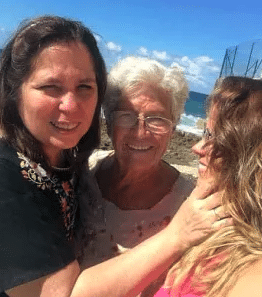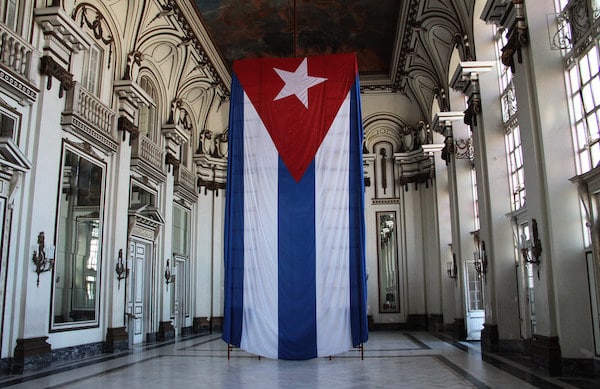This January 1st Cuba will celebrate 65 years since the triumph of the Revolution of 1959 led by Fidel and a group of valuable men and women, for whom the gratitude of the Cuban people remains intact. Today, Resumen Latinoamericano honors that victory through three women whose lives, although they lived in different historical periods, have the Revolution as a common thread. They are my great-grandmother, my grandmother, and my mother.
……

Photo: Bill Hackwell
My great-grandmother Zoyla Martinez did not forget that May downpour when the rural guard threw her out of her house, back in 1931. Until the last day of her 104 years, she remembered the same image, standing with five children clutching her sack, a few wooden belongings, and a mattress on a mud puddle in Jaguey Grande, Matanzas. It was the image of her worst nightmares.
After that day in May, when she was still in her 20’s, she knew the same thing she suspected when she looked out of the window of her former home and saw her parents working from sunrise to sunset at the plow when she was still very young: in the Cuba of “before” (before 1959), honest people, poor people, were not worth a penny.
She decided to work, to make her own home, never again to go through the humiliation of seeing herself and her small and sick children in the muddy streets of Jagüey. She sold slippers knitted by her own hands, cleaned and ironed the laundry of the wealthiest families in the area from Monday to Monday.
Years later, after paying the price of sugar at her neighborhood grocery store, she stood in front of the vendor waiting for her change. The man, with disdain, told Zoila how could she expect him to give her back a single cent, which was all that was left over from her purchase. Without saying much, she pointed to the white-columned house halfway down the block. “That house is mine, and I built it penny by penny,” she said without a muscle trembling in her face.
Homelessness was not the only painful experience my great-grandmother lived through. Her eldest daughter Mercedes died in her arms when she was only five years old, when they were returning on horseback from the only medical center within several kilometers.
The doctor who saw her, without much examination, told her that the girl’s fever was probably a cold and gave her a couple of pills to reduce it. Zoila was suspicious that it was just that, she had already heard about the diphtheria that plagued Jagüey, and feared the worst. “Don’t worry,” said the doctor, paying no attention to her concern, “with these pills she will feel better. Thirty minutes later, the little girl died.
Then, during the seventh of her pregnancies, labor pains came in the seventh month. Zoila’s mother was the midwife for this and her other six children, once again in the living room of her home. This is how she gave birth to Sergio.
I can almost see her describing the size of the baby to me, with the old woman’s hands joined together to form a shell. “He was so tiny,” she told me, “that he fit in the shoebox that I lined with white sheets, where he slept for only two nights, and then he died, because in those days doctors did not take care of premature babies, especially if they were born to poor parents.
Another of her sons, Lázaro, died later of leukemia, also at the hands of Zoila, who accompanied him in his last hours of agony. Another of her sons, Oscar, hanged himself at the age of 20 because of the depression caused by seeing a friend die while being a victim of forced labor in the Zapata Swamp. Lazaro sang like the gods, but whose poverty could not take him very far in the singing industry.
The Revolution came to Zoila on January 1, 1959, and the children who survived the Cuba of “before” were able to study beyond sixth grade. She even managed to see her grandchildren graduate from the university. She hid the pain of the preceding years with the strength of her hands. She planted avocados, mangoes and lemons in her backyard, and then sold them on the streets of the neighborhood, which gradually turned from dirt to asphalt.
She spent her last days in the hospital of her town, built after 1959, attended by a dozen doctors who did not believe that she could remain so lucid at 104 years of age. One of them, in the last consultation Zoila would receive, in March 2015, wanted to know what kept her alive in the hardest years of her existence. “I never stopped working,” she answered.

The author with her mother and grandmother.
Mirta Ramirez, my grandmother, arrived in Havana in 1959 to become a nurse when she was about to turn 24. She brought from Jagüey Grande a half-filled briefcase and, within it, the memories of a childhood of sacrifices. Her mother, Zoila, instilled in her since she was a child that life must be faced with hard work. That is why, since her adolescence, she helped her take care of the house and the rest of her siblings, cleaned houses and ironed clothes for the wealthiest in her hometown, and was for a while the maid of a hostile family that, on more than one occasion, when she was ready to leave, threw buckets of water on the clean floor just for her to dry everything again.
She became a nurse two years later, in 1961, thus fulfilling a possible dream. She had a son and kept her upbringing together with her housework and the areas she worked in to assist and check the health condition of the inhabitants of several communities in the capital.
At 90 years old, photos of her mother, her son, her granddaughters, her nursing days, are the only few luxuries that hang on the walls of her house. She overcame the pain and after-effects of a recent heart attack, thanks to the will and attention of the island’s health system. A few years earlier, when she was strong and healthy, she used to sew and read for fun, and went out every day to the streets, both to buy bread and to tell anyone who would like to hear what the Cuba of “before” was like, the Cuba of her childhood and early youth.
“There are a lot of ungrateful people out there,” she sometimes grumbled after arriving from the grocery store or market. “Whoever thinks they can come to speak to me against the revolution is mistaken. Everything in life has cost me sacrifices, but I owe a lot to it. When something seems impossible, my grandmother Mirta remembers her mother:
If she could be useful at 100 years old, then I too have the strength for more.
***
I remember, as if it were yesterday, the smell of the newspapers and boxes from the archives of the state-run newspaper Juventud Rebelde, the dust stirred up by the air conditioning, the narrow, dark hallway, and the rows of metal shelves. As a little girl, many times, when my mother, along with other journalists, assembled the next day’s pages of that newspaper, I hid to play in that place that was a world of indecipherable words and thoughts for me at that time.
From those days at the end of the 90s, I also remember the times I slept between two chairs in the newsroom, while she typed non-stop on a typewriter, with which I also sometimes played on, without her noticing. She helped, from her space, to build and maintain a country that at that time was going through the greatest of crises, which many of us children were protected from and barely noticed.
And I grew up, we grew up, accompanying each other later in other press media outlets, making sacrifices to be together. And so we continued, without ceasing to believe in the country that made it possible for my mother to become a journalist, for my grandmother to feel immortal and for my great-grandmother to see the Revolution with a new home and new hopes. Like like them I too will prevail and so will our revolution that has been built by and for the dispossessed.

